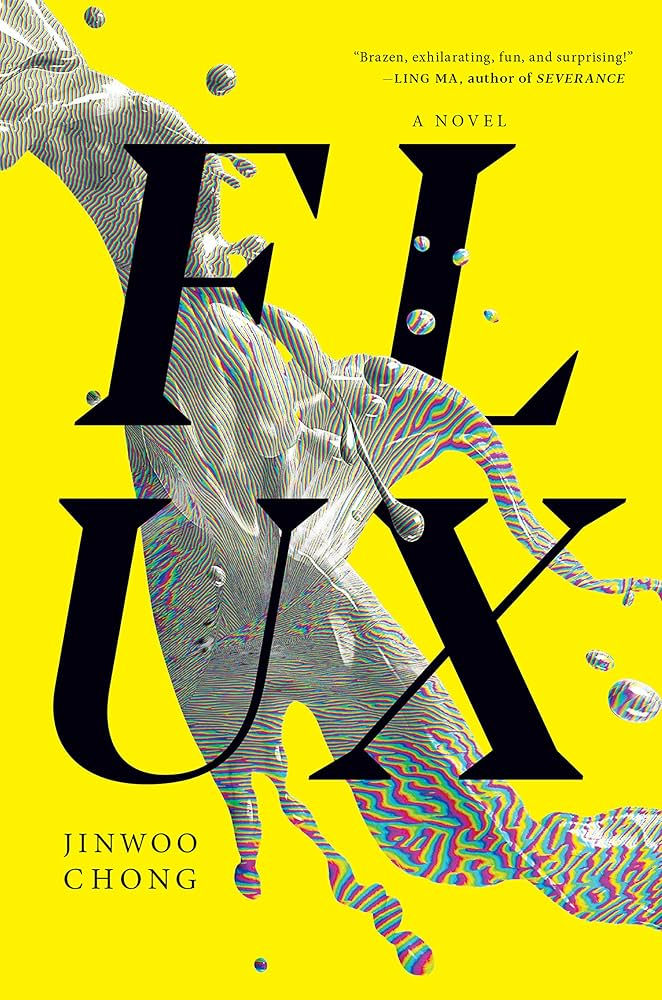Give Me a Reason: Flux
- Hans Yang
- Oct 9, 2024
- 3 min read

Photo Credit: Penguin Random House
It’s probably not like what you’ll expect. You probably clicked “TOP SCI-FI NOVELS OF 2023” on a whim, swooned at the cool yellow cover showcasing an ambiguous liquid somewhere between whole milk and a nanomachine sludge, and thought: This’ll look good on my bookshelf. I did, at least. I spotted it at my local bookstore, where it nestled in enemy territory between a couple of new Colleen Hoover releases. The all-caps FLUX, bisected and emblazoned in black, was absolutely beautiful.
Nominated for a New York Times Editor's Choice and a finalist for the PEN/Hemingway Award for Debut Novel, Flux is Columbia University MFA candidate and Georgetown alumni (CAS ‘17) Jinwoo Chong’s first novel.
It centers around 8-year-old Bo, who is grieving the death of his mother; 28-year-old Brandon, who has been fired from his mid-level job; and 48-year-old Blue, who is the key witness in a criminal trial. There’s the inclusion of time travel (or rather, time looping), multiple interweaving timelines, copious amounts of pop culture pills, and systemic Asian-American racial inequities. As well as a parody of the fall of Theranos and Elizabeth Holmes and the blossoming and celebration of sexual identity.
I was concerned and intrigued. I purchased it with a crisp twenty, got a free bookmark, and let Flux sit unthought of at the bottom of a Whole Foods bag until I got home.
The first act opens with kinetic vigor, following the recently-unemployed Brandon in second person. It does not read like any modern sci-fi you might be accustomed to; it reads literary; it reads like an experimental prototype. We follow as Brandon faux-worships Thomas Raider, a badass TV hero, and toils as a corporate drone at Metropol, an arts publication, before losing his job. His boyfriend, Gil, dimly exists in the background. Then, we are thrust into clandestine contract worker Blue’s financial problems and secret operations. When we are finally plunged into the story of brothers Bo and Kaz and their family complications, we realize that we are running three gauntlets at the exact same time. They bend and sway in tangential orbit with each other, then—as they are inexorably related to each other—cross.
First, I want to praise Flux for its unflinching rawness, its willingness to tell a story with ceaseless fluidity. I got what I came for—I got a whole lotta flux! The power, the haphazard grace—the psychic distance, changes in clarity, the dialogue; Flux flows like the knuckles of a blackout-drunk god. It breaks convention so colorfully and shows writers that they can write something arthaus without sacrificing commercial appeal. Between the crazed timelines, we get occasionally sucker punched with Ocean Vuong-esque one-liners: “That was one thing about memory. It often obeyed the capriciousness of a mind trying to hide from guilt, but one, always, had to live with deceit.”
My main qualm with Flux, however, is that it’s just too messy. The constant POV-pivots, especially from second person to omniscient third, are jarring, and the fact that there is so much to cover means that inevitably, some parts initially promised in Chong’s grand vision, are less fleshed out. Asian-American identity, a theme touted in the initial blurb, is pretty much sidelined in favor of progressing the plot by mechanical means. Bo’s story ends abruptly, an unfortunate consequence of the timelines getting disproportionate page time by the end. Promises of time travel turned out to just be implicit loops. It was confusing, and I had to reread it multiple times to truly understand. Because of the ceaseless complexities in plot and overarching ideas, I also had concerns about accessibility. I was correct. Nearly every mid-to-low low level Goodreads review moaning about Flux criticized its “utter incomprehensibility” and “lack of coherence.”
But despite all this, I think Flux is special. It’s a definite start into exciting territory. It’s a first. It’s definitely a first for Jinwoo Chong, his first novel (congrats Mr. Chong!) We should all be on the watch for more of his work in the future.
As for the verdict? Two consonants, one vowel.


Comments